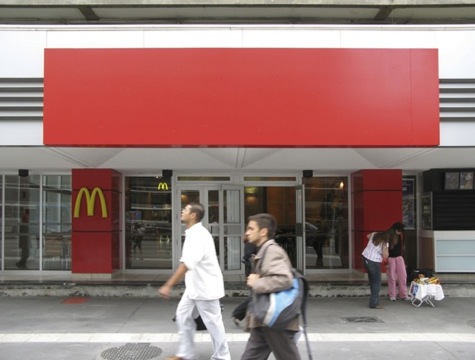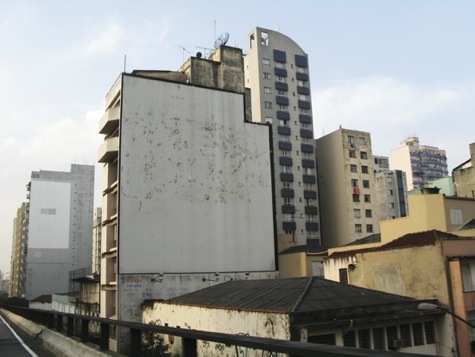Sao Paolo advertising goes underground
 Source: Financial Times (www.ft.com, author: Vincent Bevins)
Source: Financial Times (www.ft.com, author: Vincent Bevins)
Four years ago, the streets of São Paulo, South America’s biggest city, were strewn with advertising. Messages on the surfaces of buildings, buses, shops, taxis and even private homes competed with billboards to create a chaotic and dizzying corporate assault on the senses.
So, Gilberto Kassab, the centre-right mayor of the city with the continent’s biggest consumer market, came up with a radical solution: a blanket ban on outdoor advertising. In late 2006, in spite of legal wrangles and business lobbying, he announced that, almost without exception, outdoor advertising would have to be removed within months.
“The Clean City Law came from a necessity to combat pollution . . . pollution of water, sound, air and the visual,” he said. “We decided that we should start combating pollution with the most conspicuous sector – visual pollution.”
At the time, advertising and marketing executives feared the ban would be an insurmountable blow, and quietly hoped the law would not be fully enforced. Industry representatives protested that the ban would limit freedom of speech, kill jobs and badly damage their sector.
“We all thought it was the end of the world,” says Marcio Oliveira, vice-president of operations at Lew’Lara\TBWA. “We thought, ‘OK, this is gonna screw up all our business.’ ”
Three years after the new law came in, it is extremely difficult to find outdoor advertising in the city – no billboards, no ads on buses or taxis or in shop windows. But equally remarkable is how quickly big advertisers and the industry itself have adapted and, in fact, thrived.
Today, it is hard to find anyone – including among advertising and marketing professionals – who still has big complaints about the Lei Cidade Limpa, or “Clean City Law”.
The city feels cleaner, they say, and the law forced creative innovations into other, newer, advertising methods that have often been more effective. “In the first instance, everybody, including the advertisers, loved this – to see their city without this visual pollution we had in the past,” says Mr Oliveira.
“I think it’s a good law,” says Nizan Guanaes, head of Grupo ABC, Brazil’s largest advertising group. “It was a challenge for us because, of course, it’s easier to simply throw garbage advertising all over your city.”
Márcio Santoro, co-president of Agência Africa, part of Grupo ABC, says that before the law, “it was really a mess. It was terrible. There came a point that for you to be noticed you had to buy a lot of ads, because there was so much noise.”The law is now so popular that some companies that were able through legal action to maintain some outdoor presence chose not to, so as not to be seen as flying in the face of Cidade Limpa.
Advertising creatives and marketing directors were forced quickly to find new ways to spend money that had been earmarked for outdoor advertising, especially since the law came into effect almost immediately. “Usually in Brazil it takes a little time for laws to get set up,” says Marcello Queiroz, an editor at Propaganda and Marketing newspaper in São Paulo. “It was really dramatic how quick things changed. Big companies had to change their focus and strategies.” Marketing directors had to find a place to spend the money they previously put into billboards. The result, they say, was a creative flowering of new and alternative methods – including indoor innovations such as elevator and bathroom ads – but primarily in digital media. “The internet was the really big winner,” says Mr Oliveira. In 2007, there was already a move towards the internet, digital media and social networking marketing worldwide, but the Cidade Limpa law gave Brazilians an extra push, he says.
Anna Freitag, marketing manager of Hewlett-Packard Brazil, says a realisation came that outdoor advertising is less effective than these newer strategies. “A billboard is media on the road. In rational purchases it means less effectiveness . . . as people are involved in so many things that it makes it difficult to execute the call to action,” she says. “HP decided to go deeper and understand consumer behaviour – the path to purchase, and place media in this direction . . . The internet and social media are the big trends associated with point of sale presence.” It also helped that Brazilians were extremely active in social media. The country has one of the highest percentages of active Twitter users in the world and Brazilians are avid social networkers. Lalai Luna, co-founder of Remix, a new agency specialising in digital and social media strategies, often focusing on music culture, says this opened up opportunities and cash flow for young creatives with experimental models to develop their craft. “Companies had to find their own ways to promote products and brands on the streets,” she says. “São Paulo started having a lot more guerilla marketing [unconventional strategies, such as public stunts and viral campaigns] and it gave a lot of power to online and social media campaigns as a new way to interact with people.”
“The internet is the next frontier for reasons I don’t have to explain,” says Mr Guanaes. “Brazil is very sophisticated in digital and social media. That’s why we have a digital agency in the US [San Francisco’s Pereira & O’Dell] and it just won the Advertising Age award for best small agency in the US.” The Clean City Law has thrown up winners as well as losers. The businesses and workers that dealt directly with in stalling and removing billboards have not benefited from the boom in digital marketing, but the move has certainly not stopped Brazilian agencies from being the focus of much international attention.
Publicis, the world’s third largest advertising group, is in the advanced stages of negotiation to buy Talent, a São Paulo agency, for a high price that underlines how highly international companies value getting a foothold in the Brazilian market.
And some international brands are choosing Brazil as a global hub for campaigns. Mr Oliveira says Lew’Lara\TBWA is creating Visa’s global campaign for its sponsorship of Fifa events in Brazil, including the World Cup, which will be exported abroad.
The plan was probably never to maintain a complete ban on all outdoor advertising for ever. The expectation was that the law would sweep the city clean and later allow for some outdoor advertising in a small number of controlled locations.
But, three years after the implementation of Lei Cidade Limpa, few are clamouring for a return to those cluttered days.

Leave a Comment